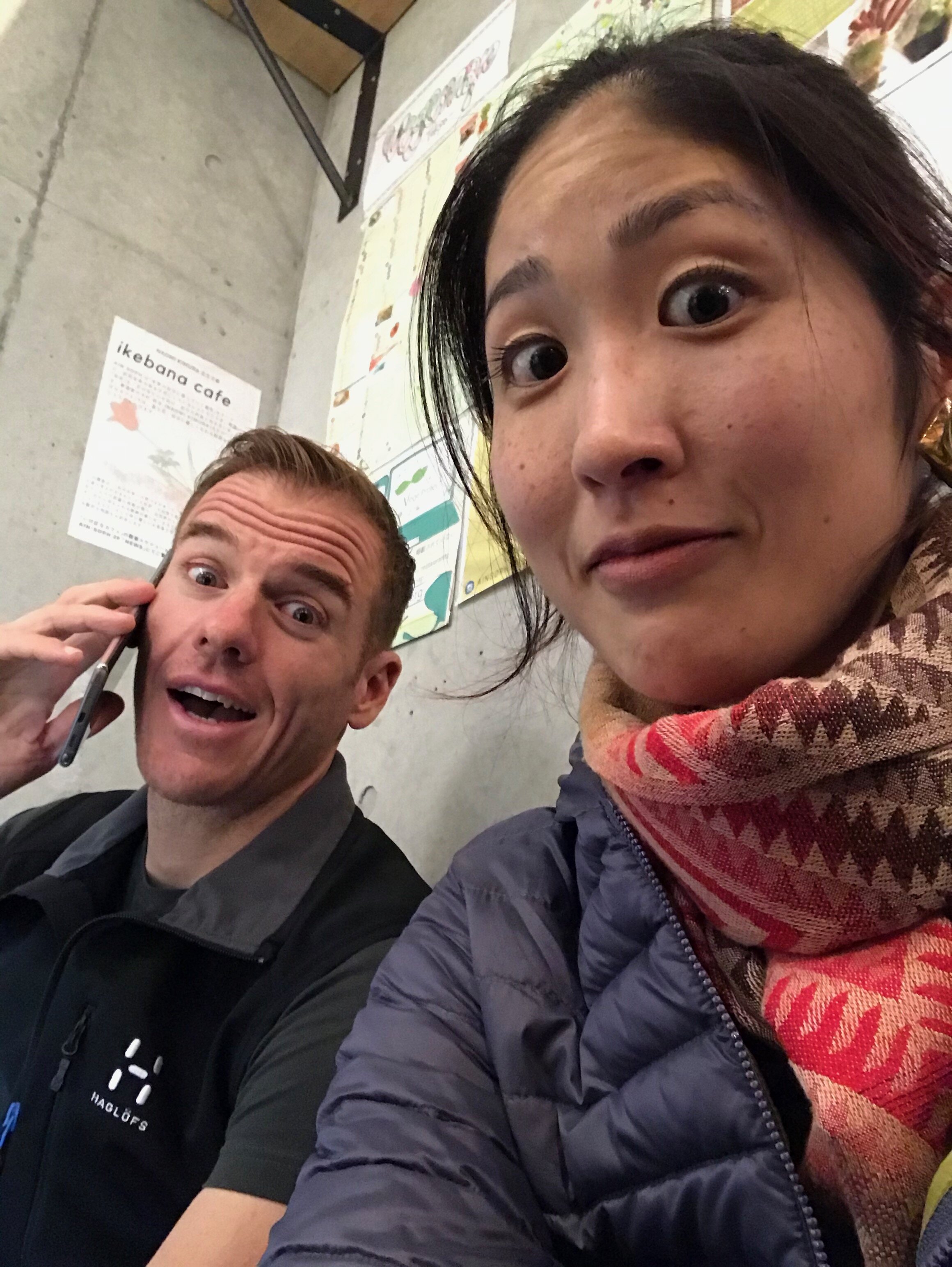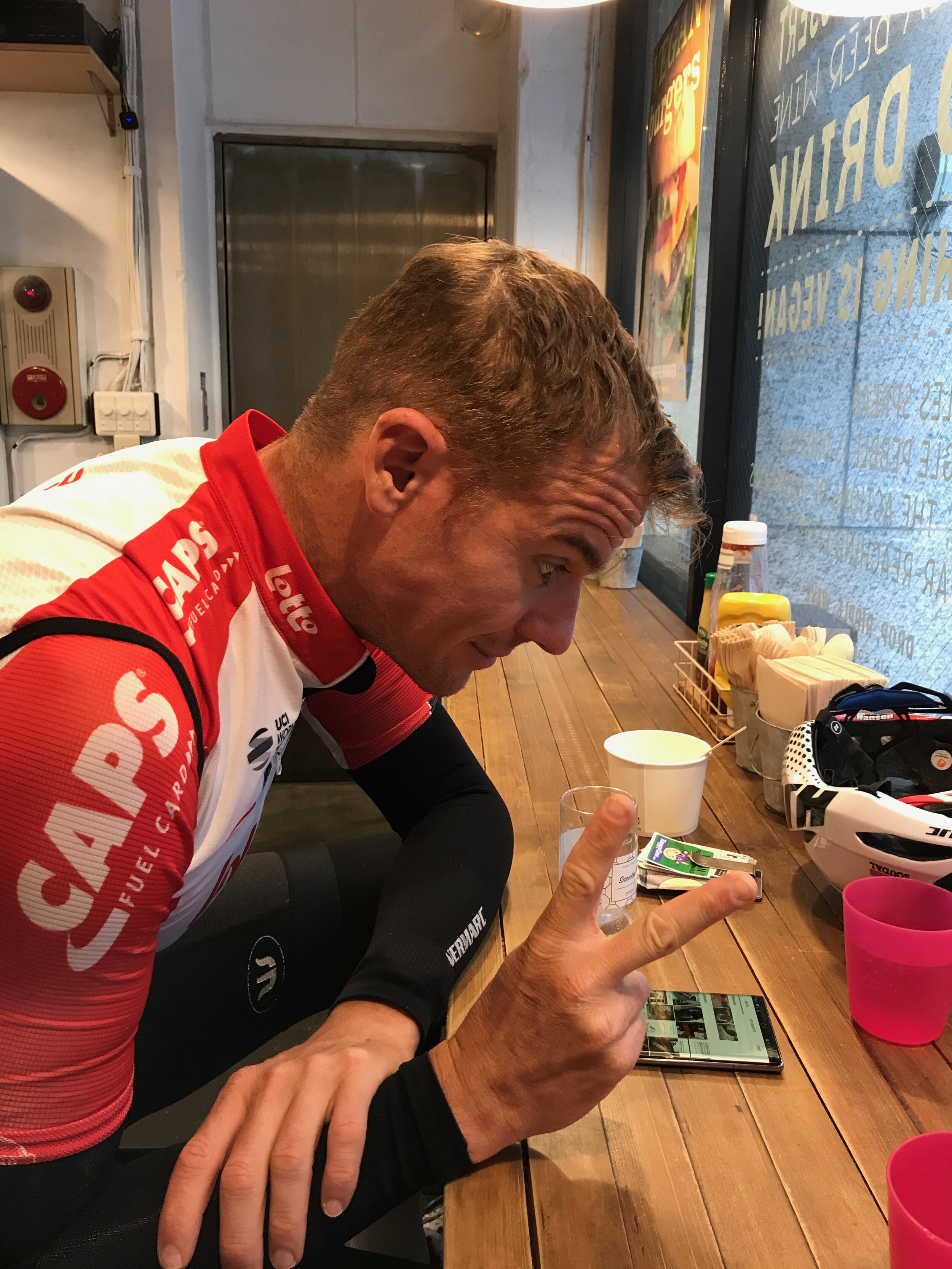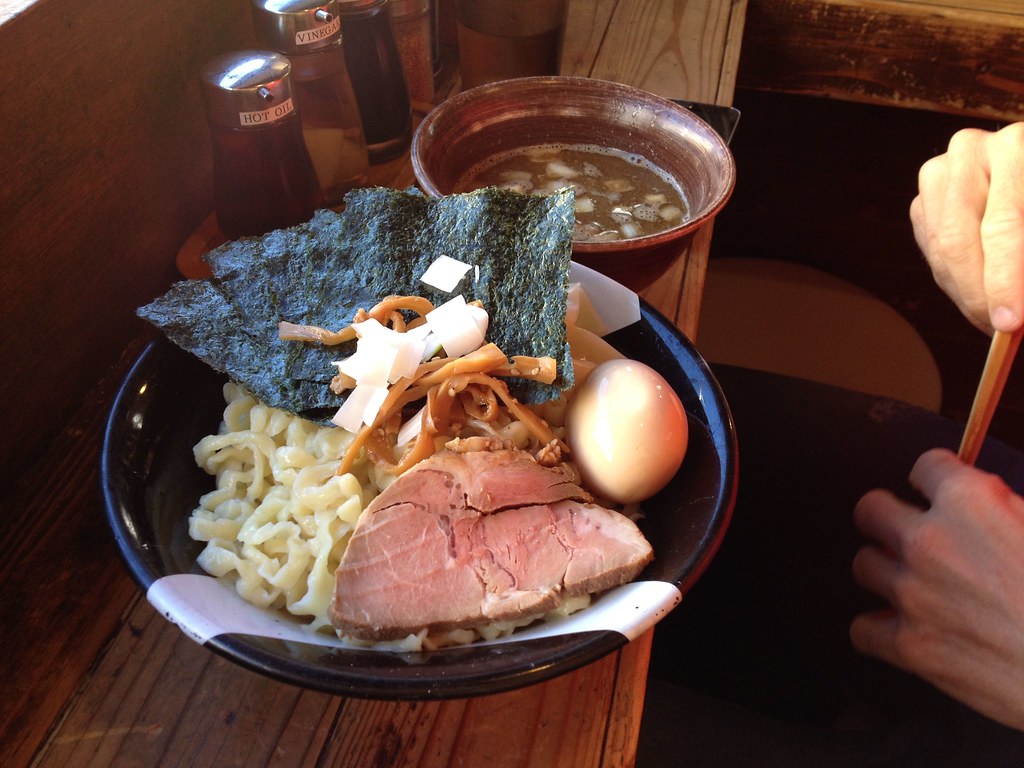“I don’t remember the negative parts of a relationship,” he said.
“Aren’t we supposed to remember stuff that hurts us?”
He looked at me.
“Like, for human survival?”
I searched his face for affirmation as I imagined some ancient version of him attempting to survive in the wilderness: repeatedly running through thorn bushes, trying to touch fire, getting nearly stomped to death by a mammoth. I sighed and looked at him, his face by then overtaken by a big, bright smile, apparently oblivious to the pain of past heartbreak.
Normally, I’d suggest therapy for the self-flagellation, but I suspect it’s what makes him a world-record-holding, WorldTour cyclist. I shook my head in exasperation and took another bite of one of Adam’s sweet potato wedges: crispy sheaths of gooey potato served with a generous sprinkle of lavender salt. It was June and we were at Elle Café, where there is an entire page of vegan nibbles, snacking on those fries before diving into tall glasses full of mango and melon and soy whipped cream. We’d just finished off bowls of vegan ramen at Afuri.
To be fair, Adam suffers from the kind of generosity and masochism that has lost wars. It’s most likely benefited him as a super domestique but has also meant that he has remained – certainly to his detriment – a close friend throughout my multiple meltdowns. His phone has been the recipient of all of my life dramas: family feuds, heartbreak, underemployment. Over the years, I’ve sent book-length emails weeping over people I’d largely forget by the time I saw Adam next, been the sole member of the entourage who tags along to professional engagements as if I belong there, and once got so mad I called him a shithead. He still messages me to tell me he’s in town, makes time to catch up in person, and passes on all the pro peloton gossip.
It’s conduct worthy of a Purple Heart – or whatever the Australian equivalent is (a lifetime supply of ANZAC cookies?) – and was most recently repeated a few weeks ago. He was in town for work related to Leomo; I was nursing the sting of a failed non-relationship. The timing, for me, was perfect.
Over almost-scone-like vegan pancakes at Ain Soph. Ginza, vegan burgers and tiramisu at Ain Soph Ripple, and cups of coffee consumed around the city, Adam told me about the usual: plans for next season and overextending himself by taking on way too much in his brief off-season. In return, I related my most recent misadventures as a super domestique of life: bending over backwards to try to make relationships work and the unfortunate realization of being the only person doing CPR on dying conversations on Tinder.
It’s not like life couldn’t be worse; I can think of several ways, off the top of my head, how it could be. But it’s not exactly made better by my tendency to bring a deliberately honed capacity to endure pain and bullshit for extended periods of time from a sport I used to love into every other area of my life. Unfortunately, I have discovered that there is no tangible reward or cardiovascular benefit to blowing myself up for someone else, lending a wheel when I don’t have to, and falling on swords. It’s actually just exhausting.
“Adam,” I’d said over those pancakes, “I’m tired.”
As the only cyclist to have completed 20 Grand Tours in a row, and one prone to play domestique on and off the bike, I’ve often asked Adam’s phone how he keeps going. He’s never really given a clear answer other than vague encouragement to be more positive. This doesn’t answer my question, I’d thought, but assumed that it was due to some misunderstanding, on his end, of course, from spending too much time in an eastern European country where the English language is apparently scarce.
It never dawned on me that he simply forgot about all the bad stuff. When he divulged this information to me back in June, I was appalled and concerned. Voluntary, selective memory loss seems like a terrible way to avoid future hurt and heartbreak. In fact, that is absolutely the kind of altruism that has led to my texting exes and watching my emotional well-being burn to the ground with the match in my hand.
In the intervening months, I’ve realized that what Adam was referring to wasn’t the stupidity to repeat past mistakes but rather the indefatigable conviction that someone else’s emotional turmoil – and the pain that may have caused him – weren’t going to affect his future choices. It’s a weird yet refreshing optimism that can be misconstrued as naïve or foolish, but in practice requires the healthy ability to remain open and vulnerable no matter how bad the prognosis for lasting love may be.
“So how do you not go back to some awful ex?” I’d asked, just as food was served and our conversation moved on to more important things like vegan omelets. I answered my own question later on, when Adam pressed me to message a super cute Australian guy who had started following me a few months prior.
“He looks like he’s in his mid-twenties,” I’d said.
“Just message him,” Adam had said, “I dated a girl who was ten years younger than me once.”
“Yeah,” I’d said, “and if you forgot what that was like, let me remind you because I remember.”
He laughed a little and I rolled my eyes again. But I suppose that’s the secret: to choose friends who will remember your heartbreak so you don’t have to, and to hope that when the time comes, they’ll keep you from running into thorn bushes, touching fire, or torching yourself with an ex.













